I don’t have the best track record with languages. Starting with French at the age of 5, I somehow managed to hop-scotch my way through Spanish, German and Latin by the time I graduated high school. No need to be impressed. My vocabulary consists solely of numbers and greetings. Any other words that might have survived in the recesses of my mind are useless as I don’t actually know to which language they belong. I think it was in Frankfurt where I got a good chuckle out a man who recognized a few Latin words in my poorly constructed German sentence. I’m not sure which one of us was more surprised by that spontaneous resurrection of the dead language, but I feel like Pope Benedict XVI would have been proud.
In college I thought I might try my hand at French again and much to my horror and my friends’ entertainment, it was the only class I nearly failed in my entire academic career. Later, when my exploration of Archeology led me to Tanzania, I learned Swahili – a pleasant experience I like to compare to baptism by fire. Upon return to the States and failing to find any local Swahili conversation clubs in Colorado Springs (shocking, I know) I felt the only language besides English in which I had actually been able to communicate slowly slip away. Use it or lose it, baby. I lost it.
So, it’s not that I haven’t tried. I just haven’t been particularly smart or patient about the whole polyglot thing. But, hey, it’s never too late to start, right?
The process of learning a new language is equal parts frustrating and hilarious. It is the continuous cycle of small victories that reveal how far you still have yet to go. The way we move through the world is so dependant on language and one of the most infuriating things in life is to be curious about something, but unable to find or use the right words to ask the question.
I’ve just finished my second week of clase de español in downtown Buenos Aires and while I find the experience to be an entertaining challenge, I’ve also noticed how quickly an exhausted brain can go negative on itself. The actual lessons are usually energizing and it’s hard not to get excited about the musicality of the Argentine accent. But on the Subway ride home, trying to buy groceries or just hoping to fall asleep, the anxieties of the mind leap into action without delay or mercy. Internal reprimands such as “You should be learning more quickly” do not take long to morph into full-on existential dilemmas. It’s a strange place to be – wondering about the purpose of your existence while your language skills equate to that of a 2 year old.
Is that why babies cry all the time?
Lucho, our Spanish teacher and possibly the world’s most patient philosopher, constantly reminds my classmate and I that we are making progress and that it’s important to give ourselves time to sink into the language and to let the words settle in to their use. As he says this, I’m usually thinking about how we still haven’t covered the future and present tense, how I haven’t memorized yesterday’s vocabulary and that I forgot to pack a lunch. All of this, while simultaneous working so hard to explain why purple is my favorite color (difficult because it has to be in Spanish, but also because I’ve always had a hard time committing to a favorite color in the first place). It’s a lot to take in, and not surprising that the brain spins off into darker places a little faster than normal.
Luckily, Lucho isn’t afraid to slow things down and my classmate, Grace, the dancing New Zealander, has an easy laugh that lightens up the whole room. We talk about our lives, our fears, our families and our favorite colors exclusively in the present tense. We laugh at our mistakes and occasionally manage to get at some profound ideas in our little classroom. As the days pass, I’ve begun to think of it all as a sort of daily Buddhist practice: meditations on living in the now, in Spanish. It’s easy to stay in the present moment when you can only speak in the present tense.
It’s also a funny way to think about personal history. Trying to explain your own story in the present tense creates this feeling that our experiences are all happening simultaneously, which might not be so far from the truth. It’s like this pearl necklace of “now” moments, strung together to exist as a narrative but without beginning or end. I like the colors purple and pink because they are the colors of sunset in Iceland. Learning Spanish is fun because I am in this city and like it here very much. The full moon rises. I am going home in 6 weeks. Winter follows me. I see you. There is magic in Argentina.
Fingers crossed that I do progress to other tenses eventually, but for now I am reveling in the present, exploring the limitations and discovering the infinite possibilities that rest within the space of a blink of an eye. Perhaps we could benefit from talking a little bit less about what was and what might be and recognize that our past and our future are colors in our present, but that this very moment, right now, is still more than we can ever say.
I suppose the practice of the “on-going now” is never something we can really catch. You lose it. Every time. A little bit like language now that I think about it. And in that case, best to get out there and use it while you’ve got it, right?


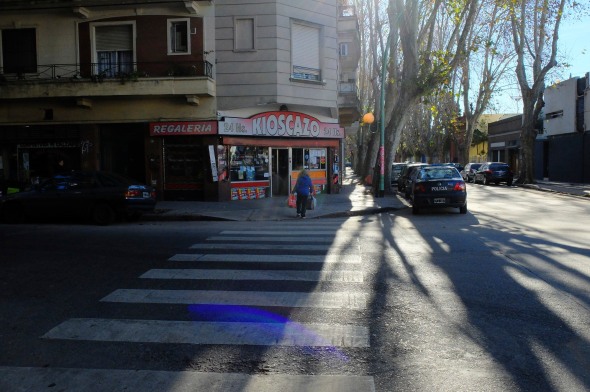
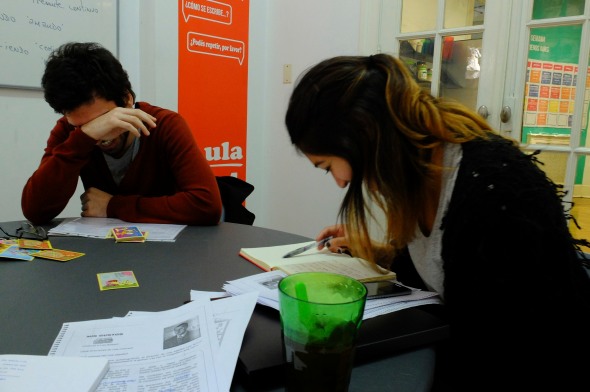
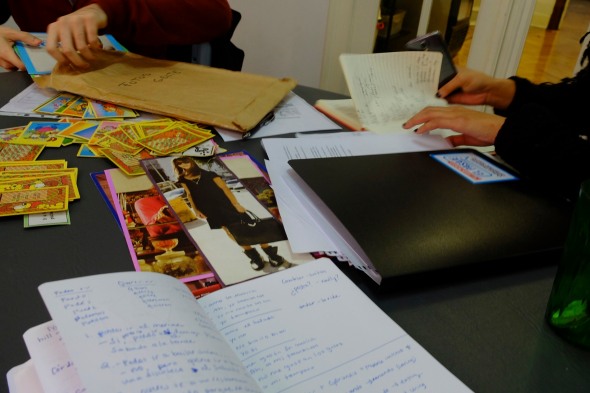
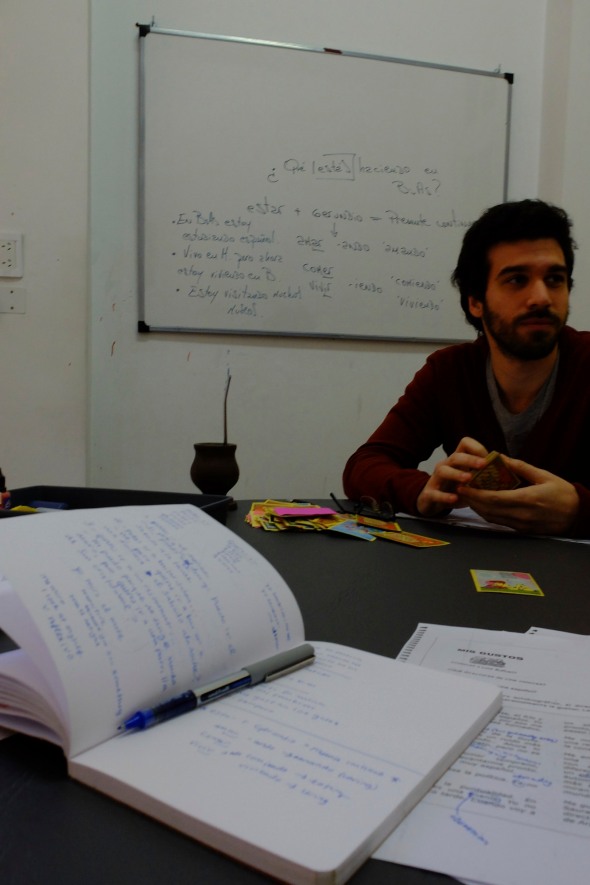


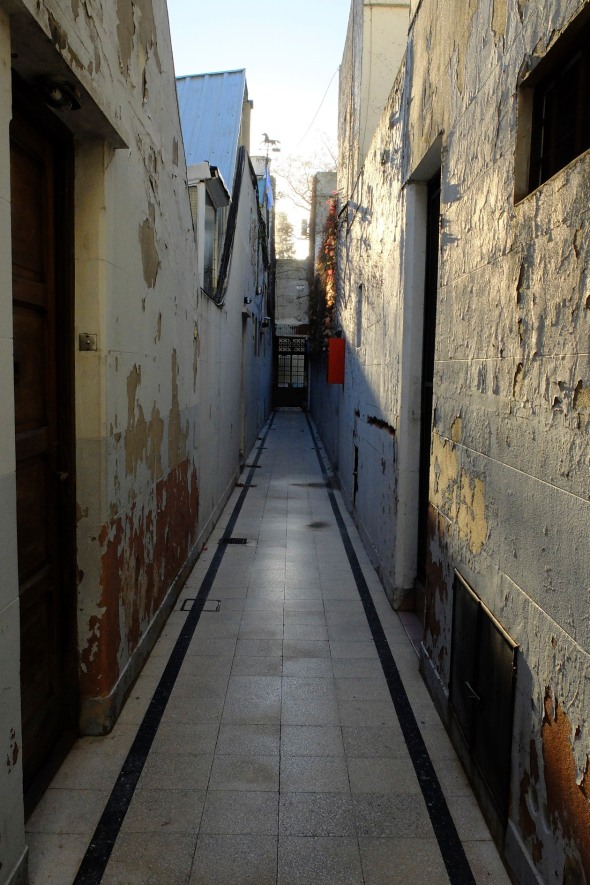
profound insights (for past, present and future), again! Thanks!
You cold be getting ready for a garage sale at the lake in the morning. I would prefer study of a language. Tomorrow I will be selling a part of my past, but in the present tense so that in the future you won’t have to do it. Make sense????
There’s a lot to love about this post. I know the trials of learning a new language too, so I feel your pain! 🙂 I love the idea of living in the present, and relishing it, when that is all one knows how to do. Now if we can just learn to appreciate the present in English too…